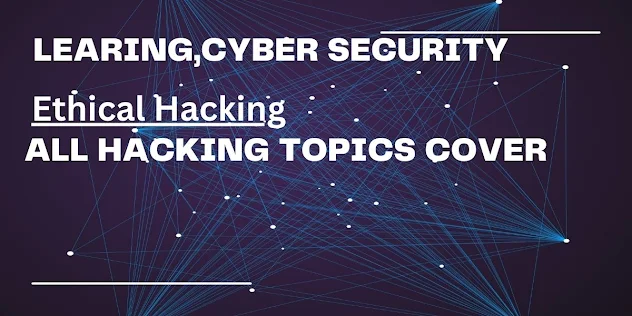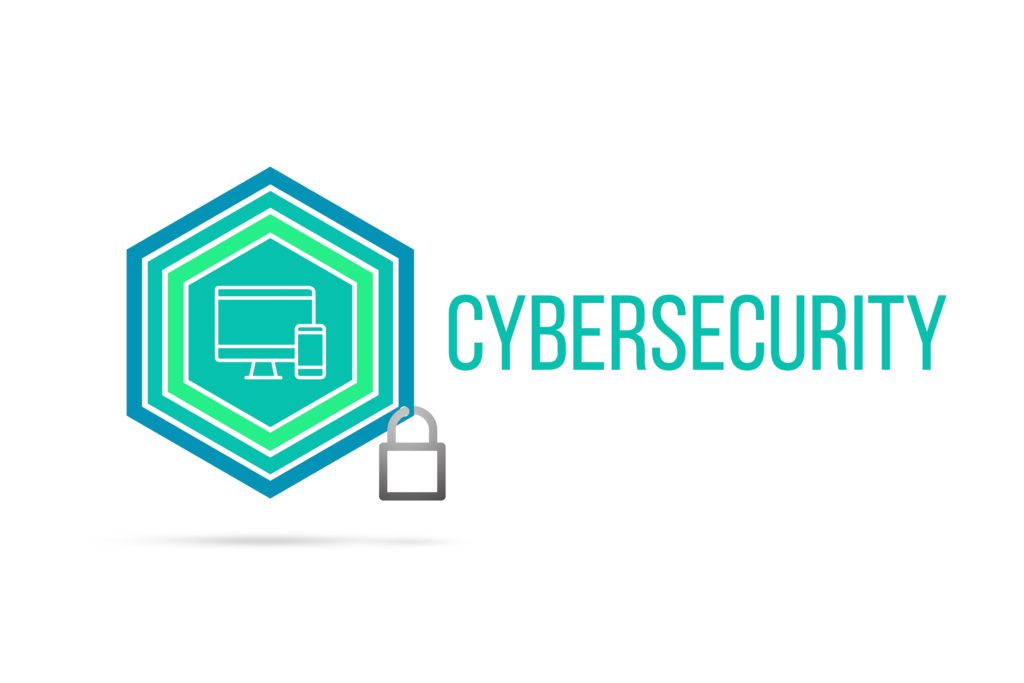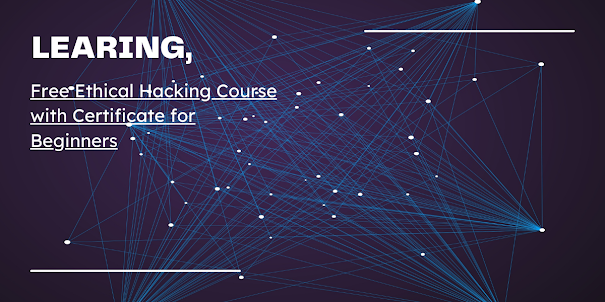Can you learn hacking for free?
Can you learn hacking for free?

I'm Cyber Security Export 8 Year Exprence
Learning about hacking involves acquiring knowledge and skills related to computer systems, networks, and cybersecurity. It's important to note that hacking can be both legal and ethical (referred to as ethical hacking or penetration testing) or illegal and malicious. I strongly advise against engaging in any illegal activities.
Learning ethical hacking or cybersecurity skills can indeed be done for free, but it's important to emphasize that hacking for malicious purposes is illegal and unethical. Ethical hacking involves understanding security systems to identify vulnerabilities and weaknesses for the purpose of improving security. Can you learn hacking for free?
If your intention is to learn about ethical hacking and cybersecurity for legal and educational purposes, there are several resources available for free
Here are some resources and steps you can take to learn ethical hacking for free:
1. Online Courses
Platforms like Coursera, edX, and Khan Academy offer free courses on cybersecurity and ethical hacking.
Websites like Cybrary and Udemy provide free introductory courses on ethical hacking.
What is hacking?
Hacking is the process by which a person or group of people gain unauthorized access to information on a network, system or computer. This is also a major concern in the field of cyber security. There are different types of hackers in the industry, often referred to as "hats" of different colors. These include black hat, white hat, red hat, gray hat, green hat and blue hats. Footnote 1Hacking is the process by which a person or group of people gain unauthorized access to information on a network, system or computer. This is also a major concern in the field of cyber security. There are different types of hackers in the industry, often referred to as "hats" of different colors. These include black hat, white hat, red hat, gray hat, green hat and blue hats. Footnote1
==================================================================================================================================================
Black hat hackers exploit vulnerabilities in computer systems to prevent an individual or organization from functioning. They create malicious programs ("malware") that help them gain access to computer networks. Can you learn hacking for free Once they have access to the system, black hat hackers can spy on victims' online activities and steal sensitive information for ransom. Footnote 2
==================================================================================================================================================
White hat hackers also break into computer systems, but they do so without malice. Instead, they aim to help organizations discover and fix system vulnerabilities that black-hat hackers can exploit if left unchecked. By thinking like cybercriminals and anticipating malicious actions, ethical hackers can strengthen a company's security infrastructure. Footnote 3
==================================================================================================================================================
Hacking can cause significant financial and reputational damage. As a result, modern businesses must rely on strong defensive and offensive security measures to prevent sensitive information from being accessed, manipulated or stolen. Ethical hackers provide additional protection for businesses that prioritize the security of their assets and workforce against cybercriminals.
CyberSecurity Professionals Work On The Digital Front Lines To Protect Organizations From Malicious Actors Every Day.
==================================================================================================================================================
3. Capture The Flag (CTF) Challenges
Participate in online CTF challenges. Websites like Hack The Box, OverTheWire, and Root Me host CTF challenges that can help you practice your skills in a controlled environment.
In CTF competitions, the flag is usually a piece of code, network hardware, or perhaps a file. In other cases, the contest may examine a series of questions, like a contest.
These can be either single incidents or ongoing challenges - and usually fall into three main categories: threat, attack-defense.These can be either single incidents or ongoing challenges - and usually fall into three main categories: threat, attack-defense
Attack-Defense
This style of competition is much closer to a game of backyard catch than Jeopardy style. In such cases, teams defend the host computer by trying to attack target computers of the opposing teams. Each team starts with a set amount of time to repair and secure the computer and try to find as many security holes as possible before the opposing attacking teams can attack. The team with the most points wins.
Jeopardy CTF
Jeopardy-style CTFs ask contestants a series of questions that reveal clues that instruct them to complete complex tasks in a specific sequence. By finding clues, the contestants learn the right direction in terms of techniques and methods needed in the future. Teams get points for each solved task. The more difficult the task, the more points you can earn for completing it successfully.
The ongoing online CTF contests are most likely Jeopardy-style. Playing alone is easier and requires less coordination between players than an Attack and Defense competition
What to do in CTF?
If you have never experienced CTF before, don't get frustrated or give up because the key to any type of hack is patience. Although this is a difficult thing at times, the only way to learn is to persevere and practice on your own
Types of Challenges
Challenges are usually divided into 6 categories for CTF, the most common challenge types are:-
Web: This type of challenge focuses on finding and exploiting vulnerabilities in web applications. Maybe test participants' knowledge of SQL Injection, XSS (Cross-Site Scripting) and more.
Forensics: Participants must examine certain types of data, such as packet analysis of the .pcap file, memory dump analysis, etc
3. Encryption: Challenges focus on decrypting encrypted strings using different types of encryption such as substitution encryption, Caesar encryption and many others.
Compilation (or Reverse Engineering): RE usually requires participants to examine a specific binary, weather PE file, ELF file, APK, or other type of executable binary. Participants must find the key through decoding, decoding using static or dynamic analysis, or other reverse engineering means
5. OSINT: The idea of OSINT is to see how much information you have and understand the clues behind the challenges using google and bit problem solving skills. So more tools like Sherlock and not focus on domain list etc.
6. Miscellaneous: Anything not listed that is still related to security belongs to this category. This need requires some Google-Fu skills. In short, it can have it all.
4. Reading Online Resources
There are numerous blogs, forums, and websites that provide free articles, tutorials, and guides on ethical hacking. Examples include OWASP, Hack This Site, and Null Byte.
2. Programming Skills
Ethical hacking requires a strong foundation of programming skills. After all, ethical hackers use their knowledge of code to find vulnerabilities in systems and then propose solutions to fix those vulnerabilities. Without programming skills, it would be impossible to understand how systems work and find weaknesses in them. the most Common Programming Languages Used By Ethical Hacker Are python, java And Php
however, Any Language That Can Be Used To Write Code Can Be Used For Hacking Purposes- The key is to have a strong understanding of how code works and how it can be used to create or solve problems. There are many resources available online for learning how to code, so there's no excuse not to have at least some coding skills before you try ethical hacking.
3. Database Skills
Ethical hacking requires several different skills to be successful. One of the most important ethical hacking skills is the ability to work with databases. Hackers must understand the structure and operation of databases to find vulnerabilities. In addition, hackers must be able to use database management tools to manipulate data and obtain limited information. Without these skills, it would be very difficult for ethical hackers to do their jobs.
4. SQL Skills
Ethical hacking is an increasingly popular profession that requires very specific skills. Perhaps one of the most important ethical hacks an ethical hacker needs is the ability to write and understand SQL queries. SQL, or Structured Query Language, is a programming language designed specifically to work with databases. To find vulnerable information in a database,
an ethical hacker must be able to create SQL queries that can extract the desired information
Requires A Deep Understanding Of How Databases Are Structured And How SQL Can Be Used To Manipulate Them. Without this essential skill, ethical hacking would be impossible
5. Linux Skills
As any IT professional knows, Linux is a powerful operating system that offers users a wide range of tools and features. Linux skills are essential for ethical hackers because they allow you to access the inner workings of a system and identify potential vulnerabilities. In addition, Linux capabilities allow you to create custom scripts and programs that can be used to automate various tasks.
Although there are many different ways to learn Linux skills, the most effective way is to gain hands-on experience working with several different distributions. This will give you a better understanding of how Linux works and allow you to tailor your tools and techniques to your specific needs
6. Cryptography
Everyone involved in the cyber security field knows that ethical hacking is an important tool to ensure information security. By identifying and exploiting system vulnerabilities, ethical hackers can help prevent data leaks and other malicious activities. However, ethical hacking isn't just about tinkering until you find a weak spot. Instead, it requires a careful and systematic approach. One of the main ethical hacking skills required for ethical hacking is coding. Encryption is the practice of encrypting and decrypting information. Ethical hackers use encryption technology to protect data from unauthorized access. They also use it to create "backdoors" and "back doors". Access the system so they can access sensitive information without generating an alert. Therefore, encryption is an essential tool for any ethical hacker.
Ethical Hacker Skills A Comprehensive Guide
In a world dominated by technology, the demand for ethical hackers has soared to unprecedented heights. These digital guardians play a crucial role in fortifying our online defenses, ensuring that our sensitive information remains out of the clutches of cyber threats. If you've ever wondered about the fascinating realm of ethical hacker skills, this article is your comprehensive guide. From understanding the fundamentals to mastering advanced techniques, let's embark on a journey into the world of ethical hacking.
Decoding the Essence of Ethical Hacking
Before delving into the specific skills, let's grasp the essence of ethical hacking. Ethical hacking involves authorized penetration testing to identify vulnerabilities in a system. The goal is not to exploit weaknesses maliciously but to strengthen security measures proactively.
Mastering Programming Languages
At the core of ethical hacking lies proficiency in programming languages. Python, Java, and C++ are essential tools in an ethical hacker's arsenal. These languages empower them to script custom exploits and understand the intricacies of security systems.
Networking Know-How
Understanding the intricacies of networks is fundamental. Ethical hackers need to be well-versed in protocols like TCP/IP, DNS, and firewalls. This knowledge allows them to navigate through network structures, identifying potential vulnerabilities.
Web Application Security
In a digital landscape dominated by web applications, ethical hackers must specialize in web security. Knowledge of Cross-Site Scripting (XSS), SQL Injection, and Cross-Site Request Forgery (CSRF) is crucial for fortifying web systems.
Cryptography Competence
A strong foundation in cryptography is indispensable. Ethical hackers utilize encryption and decryption techniques to secure data transmission and storage. Understanding algorithms and protocols ensures the integrity of sensitive information.
Security Assessment Techniques
Proficiency in security assessment tools is paramount. Tools like Wireshark, Nmap, and Metasploit aid ethical hackers in scanning networks, identifying vulnerabilities, and simulating cyber-attacks to gauge system resilience.
Incident Response Skills
In the dynamic landscape of cybersecurity, incident response skills are crucial. Ethical hackers need to swiftly analyze and mitigate security incidents, minimizing potential damage.
Social Engineering Awareness
Hackers often exploit the human element through social engineering. Ethical hackers must be adept at recognizing and preventing phishing attempts, ensuring the human factor becomes a line of defense, not vulnerability.
Continuous Learning and Adaptability
The digital landscape evolves rapidly, making continuous learning a cornerstone of ethical hacking. Staying updated on the latest threats, tools, and techniques is vital for effective cybersecurity.
Legal and Ethical Understanding
Last but not least, ethical hackers operate within legal and ethical boundaries. Understanding the legal implications of hacking activities is imperative to ensure that their efforts align with ethical standards.
Conclusion
Empowering Defenders of the Digital Realm
In conclusion, mastering ethical hacker skills is a dynamic journey that requires a multifaceted skill set. From programming prowess to a deep understanding of network vulnerabilities, ethical hackers stand as the guardians of our digital world. As we navigate an era where cyber threats are omnipresent, the significance of ethical hacking in fortifying our online defenses cannot be overstated. Embrace the evolving landscape, equip yourself with these essential skills, and become a stalwart defender of the digital realm.







